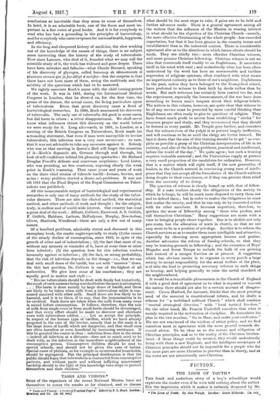TASKS AND VISIONS.• SOILE of the organizers of the recent
National Mission have set themselves to assess the results so far obtained, and to discuss
• Tan and rttian• Series of Pradical Papa. Edited by F. L. Road. Londe. • Umbra ard Co. 13s. 6d. neLl
what should be the next steps to take, if gains are to be held and further advances made. There is a general agreement among all the writers that the influence of the Mission in rousing interest in what should be the objective of the Christian Church—namely, the more effective Christianizing of the whole people—has exceeded expectation, but that it has been greater in the country towns and rural districts than in the industrial centres. There is considerable agreement also as to the directions in which future efforts should be made. They are chiefly two : more effective Christian witness, and more genuine Christian fellowship. Christian witness is not an idea that commends itself readily to an Englishman. It associates itself in his mind with cant ; and undoubtedly what has been often understood by the word has been an unseasonable and tactless expression of religions opinions, often combined with what seems an impertinent curiosity as to those of one's neighbour. Englishmen in the post, unless they have belonged to the Evangelical school, have preferred to witness to their faith by deeds rather than by words. But such reticence has certainly been carried too far, and the experiences, especially the bereavements, of the war have done something to loosen men's tongues about their religious beliefs. The writers in this volume, however, are quite clear that witness to be of any service must be preceded by more careful thinking than Englishmen are often ready to give to questions of religion. They have found much profit to accrue from establishing " circles " for co:ninon prayer and study, and they recommend that they should be formed in every parish. Mr. Temple goes further, and considers that the witness even of the pulpit is at present largely ineffective, and will continue to be so until the clergy are better trained. He lays it down that the aim of this training should be to get" as com- plete as possible a grasp of the Christian interpretation of life in its entirety, and also of the leading problems, practical and intellectual, before the world of the day." We quite agree: but such a training requires trainable material: and the Universities supply at present a very small proportion of the candidates for ordination. However, that is a matter which will right itself, if the new generation of leaders in the Church succeed in convincing young men of intelli- gence that they can accept all the formularies of the Church without doing despite to their consciences, or if they can procure them relief from the necessity of so doing.
The question of witness is closely bonnd up with that of fellow- ship. If a man realizes clearly the obligations of the society to which he belongs, he will be much more disposed to carry them out and to defend them; but in order to realize the obligations he must first realize the society, and that he can only do by concerted action with its other members. It becomes important, therefore, to quicken the sense of fellownhip among "those who profess, and call themselves Christians." Many suggestions are made with a view to bringing people closer together. One is to abolish not only pew.rente, but the allocation of seats in church, so that no one may morn to be in a position of privilege. Another is to reform the Church services so as to render them more intelligible and attractive, especially by choosing more appropriate lessons and psalms. Another advocates the reform of Sunday.schools, -so that they may he training-grounds in fellowship: and the extension of Boys' Brigades and Scout Troups to include the bulk of our growing lads instead of a meagre fraction as at present. A suggestion which has obvious merits is to organize in every parish a large society to accept responsibility for the social welfare of the place, and take the lead in promoting neeemsry reforms in such things as housing, and helping generally to raise the moral standard of the neighbourhood.
It would be a remarkable phenomenon in the Church of England if with a good deal of agreement as to what is required to convert the nation there should not also bo a certain amount of disagree- ment. Canon Mefferd, for instance, thinks that the most pressing need of the moment is constitutional reform, and he drafts a scheme for "a mobilized militant Church " which shall combine "central strategical direction " with "local tactical freedom." On the other hand, Mr. Francis Underhill considers that what is mainly required is the restoration of discipline. He formulates his plan in the two maxims, "Go to Mass, and make your confession." We are not convinced of the wisdom of either policy, and wo find ourselves most in agreement with the more general counsels dis- cussed above. To be clear as to the nature and obligation of Christian principles, and as to the reality of the Christian brother- hood—if these things could be secured, they would undoubtedly bring with them a now England ; and the intelligent acceptance of Christian principles should not be impossible for a people who for the most part are more Christian in practice than in theory, and at the worst are not intentionally anti-Christian.


























 Previous page
Previous page